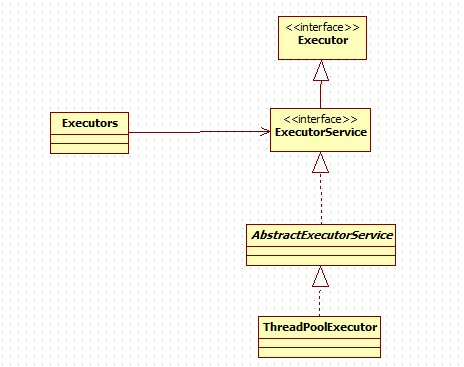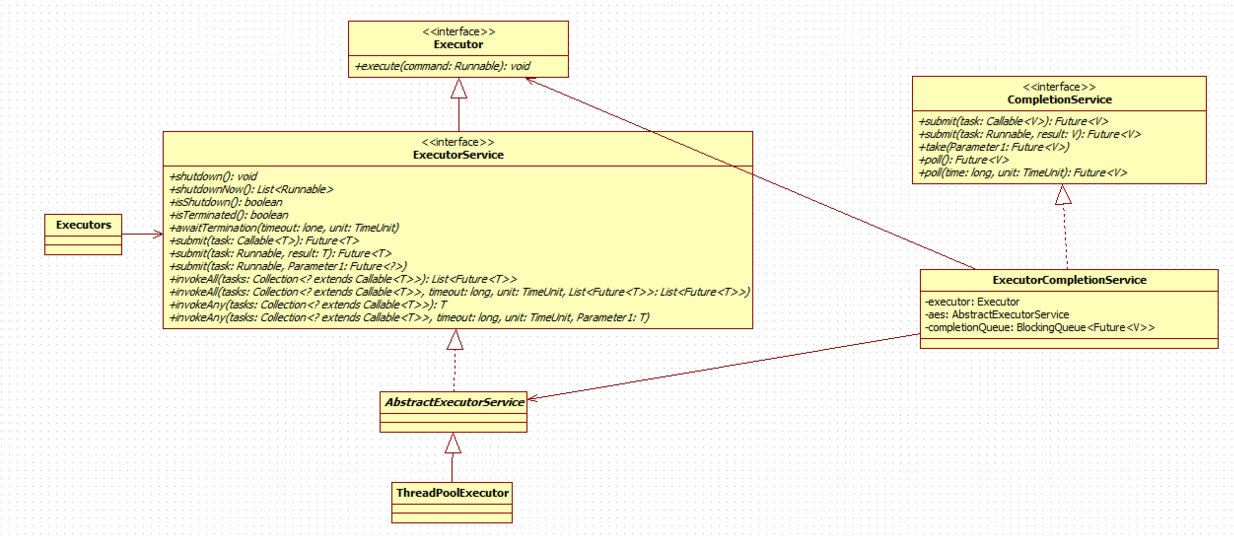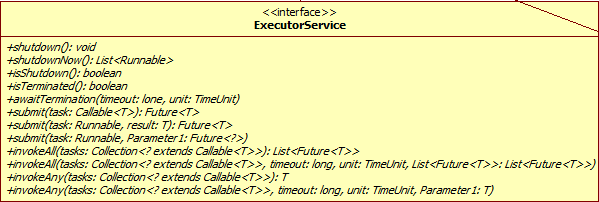Executor框架(一)
类继承关系

更详细的继承关系:

ExecutorComplitionService类
在说Executor接口及实现类之前,先聊聊ExecutorComplitionService。
成员变量
private final Executor executor;
private final AbstractExecutorService aes;
private final BlockingQueue<Future<V>> completionQueue;
executor
执行器,需要对象创建者提供,任务是通过该执行器执行的。
aes
暂时未领会到这个成员变量的精髓在哪里。
completionQueue
已执行完任务队列。
QueueingFuture内部类
private class QueueingFuture extends FutureTask<Void> {
QueueingFuture(RunnableFuture<V> task) {
super(task, null);
this.task = task;
}
protected void done() { completionQueue.add(task); }
private final Future<V> task;
}
QueueingFuture继承自FutureTask类,主要是为了实现done()方法,在FutureTask类中,done()方法是一个空方法。在FutureTask类中,不管任务是执行成功还是执行失败抛出异常,其run()方法的调用链都会调用到done()方法。QueueingFuture 类的done方法是把执行完的task添加到completionQueue队列中。
newTaskFor方法
只是创建新的FutureTask对象。
private RunnableFuture<V> newTaskFor(Callable<V> task) {
if (aes == null)
return new FutureTask<V>(task);
else
return aes.newTaskFor(task);
}
private RunnableFuture<V> newTaskFor(Runnable task, V result) {
if (aes == null)
return new FutureTask<V>(task, result);
else
return aes.newTaskFor(task, result);
}
构造方法
public ExecutorCompletionService(Executor executor) {
if (executor == null)
throw new NullPointerException();
this.executor = executor;
this.aes = (executor instanceof AbstractExecutorService) ?
(AbstractExecutorService) executor : null;
this.completionQueue = new LinkedBlockingQueue<Future<V>>();
}
public ExecutorCompletionService(Executor executor,
BlockingQueue<Future<V>> completionQueue) {
if (executor == null || completionQueue == null)
throw new NullPointerException();
this.executor = executor;
this.aes = (executor instanceof AbstractExecutorService) ?
(AbstractExecutorService) executor : null;
this.completionQueue = completionQueue;
}
两个构造方法大同小异,差别在是否使用创建者提供的阻塞队列。
submit方法
public Future<V> submit(Callable<V> task) {
if (task == null) throw new NullPointerException();
RunnableFuture<V> f = newTaskFor(task);
executor.execute(new QueueingFuture(f));
return f;
}
public Future<V> submit(Runnable task, V result) {
if (task == null) throw new NullPointerException();
RunnableFuture<V> f = newTaskFor(task, result);
executor.execute(new QueueingFuture(f));
return f;
}
两个方法功能相同,只不过分别针对Callable和Runnable提供的。
take和poll
public Future<V> take() throws InterruptedException {
return completionQueue.take();
}
public Future<V> poll() {
return completionQueue.poll();
}
public Future<V> poll(long timeout, TimeUnit unit)
throws InterruptedException {
return completionQueue.poll(timeout, unit);
}
从已完成队列中取出任务结果。
Executor接口
public interface Executor {
void execute(Runnable command);
}
ExecutorService接口

public interface ExecutorService extends Executor {
void shutdown();
List<Runnable> shutdownNow();
boolean isShutdown();
boolean isTerminated();
boolean awaitTermination(long timeout, TimeUnit unit)
throws InterruptedException;
<T> Future<T> submit(Callable<T> task);
<T> Future<T> submit(Runnable task, T result);
Future<?> submit(Runnable task);
<T> List<Future<T>> invokeAll(Collection<? extends Callable<T>> tasks)
throws InterruptedException;
<T> List<Future<T>> invokeAll(Collection<? extends Callable<T>> tasks,
long timeout, TimeUnit unit)
throws InterruptedException;
<T> T invokeAny(Collection<? extends Callable<T>> tasks)
throws InterruptedException, ExecutionException;
<T> T invokeAny(Collection<? extends Callable<T>> tasks,
long timeout, TimeUnit unit)
throws InterruptedException, ExecutionException, TimeoutException;
}
AbstractExecutorService抽象类
public abstract class AbstractExecutorService implements ExecutorService {
......
}
newTaskFor方法
创建FutureTask任务。
protected <T> RunnableFuture<T> newTaskFor(Runnable runnable, T value) {
return new FutureTask<T>(runnable, value);
}
protected <T> RunnableFuture<T> newTaskFor(Callable<T> callable) {
return new FutureTask<T>(callable);
}
submit方法
提交任务。
public Future<?> submit(Runnable task) {
if (task == null) throw new NullPointerException();
RunnableFuture<Void> ftask = newTaskFor(task, null);
execute(ftask);
return ftask;
}
public <T> Future<T> submit(Runnable task, T result) {
if (task == null) throw new NullPointerException();
RunnableFuture<T> ftask = newTaskFor(task, result);
execute(ftask);
return ftask;
}
public <T> Future<T> submit(Callable<T> task) {
if (task == null) throw new NullPointerException();
RunnableFuture<T> ftask = newTaskFor(task);
execute(ftask);
return ftask;
}
AbstractExecutorService抽象类中并没有实现execute(ftask)方法,该方法在各个实现类中实现。
doInvokeAny方法
doInvokeAny方法被下面的invokeAny调用。
private <T> T doInvokeAny(Collection<? extends Callable<T>> tasks,
boolean timed, long nanos)
throws InterruptedException, ExecutionException, TimeoutException {
if (tasks == null)
throw new NullPointerException();
int ntasks = tasks.size();
if (ntasks == 0)
throw new IllegalArgumentException();
ArrayList<Future<T>> futures = new ArrayList<Future<T>>(ntasks);
ExecutorCompletionService<T> ecs =
new ExecutorCompletionService<T>(this);
try {
ExecutionException ee = null;
final long deadline = timed ? System.nanoTime() + nanos : 0L;
Iterator<? extends Callable<T>> it = tasks.iterator();
futures.add(ecs.submit(it.next()));
--ntasks;
int active = 1;
for (;;) {
/*只有任务已经执行完了(包括成功和抛出异常),这里的poll返回的才不是null*/
Future<T> f = ecs.poll();
if (f == null) {
if (ntasks > 0) {
--ntasks;
futures.add(ecs.submit(it.next()));
++active;
}
else if (active == 0)
break;
else if (timed) {
f = ecs.poll(nanos, TimeUnit.NANOSECONDS);
if (f == null)
throw new TimeoutException();
nanos = deadline - System.nanoTime();
}
else
f = ecs.take();
}
if (f != null) {
--active;
try {
return f.get();
} catch (ExecutionException eex) {
ee = eex;
} catch (RuntimeException rex) {
ee = new ExecutionException(rex);
}
}
}
if (ee == null)
ee = new ExecutionException();
throw ee;
} finally {
for (int i = 0, size = futures.size(); i < size; i++)
futures.get(i).cancel(true);
}
}
doInvokeAny不断的提交任务,直到有任务执行成功或者任务都提交了。提交的任务如果抛出了异常,先记录,如果最后任务都失败了,再把记录的异常重新抛出。如果是所有的任务都提交完了之后才有任务结束,那么状态就取决于这个最先完成的任务状态。在退出前,会取消掉所有任务的执行(对于那些执行完或者执行中已经抛出异常的任务,cancel没有任何效果)。
invokeAny方法
public <T> T invokeAny(Collection<? extends Callable<T>> tasks)
throws InterruptedException, ExecutionException {
try {
return doInvokeAny(tasks, false, 0);
} catch (TimeoutException cannotHappen) {
assert false;
return null;
}
}
public <T> T invokeAny(Collection<? extends Callable<T>> tasks,
long timeout, TimeUnit unit)
throws InterruptedException, ExecutionException, TimeoutException {
return doInvokeAny(tasks, true, unit.toNanos(timeout));
}
invokeAny的主要逻辑都在doInvokeAny中。
invokeAll方法
public <T> List<Future<T>> invokeAll(Collection<? extends Callable<T>> tasks)
throws InterruptedException {
if (tasks == null)
throw new NullPointerException();
ArrayList<Future<T>> futures = new ArrayList<Future<T>>(tasks.size());
boolean done = false;
try {
for (Callable<T> t : tasks) {
RunnableFuture<T> f = newTaskFor(t);
futures.add(f);
execute(f);
}
for (int i = 0, size = futures.size(); i < size; i++) {
Future<T> f = futures.get(i);
if (!f.isDone()) {
try {
f.get();
} catch (CancellationException ignore) {
} catch (ExecutionException ignore) {
}
}
}
done = true;
return futures;
} finally {
if (!done)
for (int i = 0, size = futures.size(); i < size; i++)
futures.get(i).cancel(true);
}
}
public <T> List<Future<T>> invokeAll(Collection<? extends Callable<T>> tasks,
long timeout, TimeUnit unit)
throws InterruptedException {
if (tasks == null)
throw new NullPointerException();
long nanos = unit.toNanos(timeout);
ArrayList<Future<T>> futures = new ArrayList<Future<T>>(tasks.size());
boolean done = false;
try {
for (Callable<T> t : tasks)
futures.add(newTaskFor(t));
final long deadline = System.nanoTime() + nanos;
final int size = futures.size();
// Interleave time checks and calls to execute in case
// executor doesn't have any/much parallelism.
for (int i = 0; i < size; i++) {
execute((Runnable)futures.get(i));
nanos = deadline - System.nanoTime();
if (nanos <= 0L)
return futures;
}
for (int i = 0; i < size; i++) {
Future<T> f = futures.get(i);
if (!f.isDone()) {
if (nanos <= 0L)
return futures;
try {
f.get(nanos, TimeUnit.NANOSECONDS);
} catch (CancellationException ignore) {
} catch (ExecutionException ignore) {
} catch (TimeoutException toe) {
return futures;
}
nanos = deadline - System.nanoTime();
}
}
done = true;
return futures;
} finally {
if (!done)
for (int i = 0, size = futures.size(); i < size; i++)
futures.get(i).cancel(true);
}
}
}
invokeAll也很好理解,执行所有的任务。如果最后由于抛出异常退出,那就取消各个任务的执行。注意,两个方法会吞下CancellationException 和ExecutionException 异常。



 浙公网安备 33010602011771号
浙公网安备 33010602011771号